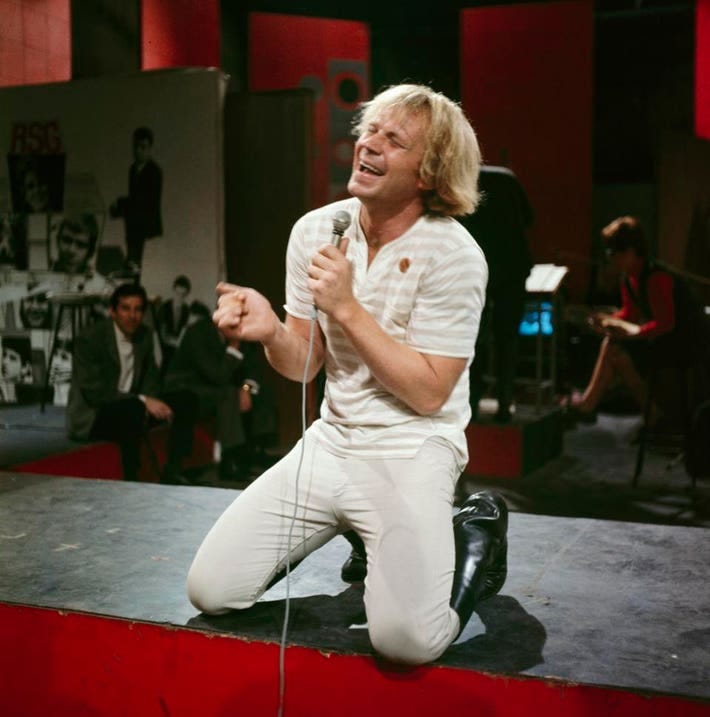"Eve of Destruction" by Barry McGuire (1965)
My favorite protest songs of the 60s and early 70s
This is the third in a series of protest songs from the sixties and early seventies that I’m sending out while taking a break from researching and writing.
We’ve already listened to two songs, in case you missed them:
“Blowin’ in the Wind” by Bob Dylan (1963)
“Masters of War” by Judy Collins (1963)
Today we jump two years ahead to a debut protest song that got leaked, banned, and then went straight to the top of the charts.
Protest song of the day
No wonder today’s song, “Eve of Destruction,” is so good. It was written by the wunderkind musician and songwriter P.F. Sloan, who was a session guitarist with the famous Wrecking Crew in Los Angeles and played on the albums of such groups as The Mamas and The Papas. He is, in fact, the one who came up with that haunting guitar intro to “California Dreamin’.”
Working for Lou Adler at Dunhill Records, he also wrote or co-wrote 45 hits that made the charts between 1965 and 1967, recorded by such artists as Jan and Dean, the Turtles, the Searchers, Herman’s Hermits, the Fifth Dimension, and the Grass Roots. You might remember the Top 10 hit “Secret Agent Man” by Johnny Rivers, which he co-wrote with Steve Barri.
Sloan was sole writer on “Eve of Destruction,” his only composition that went all the way to #1 in the U.S. (as well as in Canada and Europe). What’s surprising about its popularity is that it’s a song about the ills of the world in the 1960s, including intolerance, the civil rights marches, the Kennedy assassination, mutually assured nuclear annihilation, the military draft, and war.
You know, really fun topics.
The lyrics are growled out by Barry McGuire as an argument with his friend, another ‘boy,’ who doesn’t share his belief that the world is on the eve of destruction.
Label head Lou Adler thought the song was too depressing and wouldn’t get radio play. He told producers Sloane and Barri to get a finished version done as expeditiously as possible to serve as the B side for something else.
It turns out that the universe had other plans for this song.
Sloane and Barri had McGuire do a quick demo on the completed backing track, apparently to help him learn the words. McGuire had to sing the lyrics off a crumpled piece of paper he pulled from his back pocket.
Someone — it’s not clear who the culprit was — leaked that rough demo to the number one radio station in L.A., KFWB. By the very next morning the song was playing over the airwaves and rapidly climbing the charts.
Lou Adler was irate and demanded that Sloan and Barri get it off the air. But the radio station refused, saying that it was the most requested song they’d had since the Beatles’ “I Want to Hold Your Hand.” They were going to keep playing it no matter what Dunhill wanted.
In this fast-paced 3-minute video, co-producer Steve Barri and singer Barry McGuire relate the extraordinary sequence of events:
The reaction it received from ‘the establishment’ no doubt also helped push the song to the top of the charts. Some U.S. radio stations and Radio Scotland banned it, while the BBC deemed it unsuitable for “general entertainment programmes” (although it was allowed on Top of the Pops, which catered to the rock ’n’ roll audience).
You’d think they’d learn by now. The more you ban and suppress things, the more popular things become — even when they’re not worth the effort.
But this song was worth that effort, in my opinion. A song crafted by a highly skilled musician and songwriter, played by some of the best session musicians in the business, and delivered by a singer who was authentic and ‘loose’ because he thought it was just a demo.
Plus the timing was exquisite. As alluded to by McGuire in the video, the song’s line “You’re old enough to kill but not for votin’” became a rallying cry for lowering the voting age from 21 to 18, resulting in the ratification of the 26th Amendment to the U.S. Constitution in 1971.
That slapdash demo version turned out to be pure protest song gold. Here it is:
Song credits
Songwriter - P.F. Sloan
Musicians:
Barry McGuire – vocals, guitar, harmonica
P. F. Sloan – guitar
Tommy Tedesco – guitar
Larry Knechtel – bass
Hal Blaine – drums
Steve Barri – percussion
Technical:
Lou Adler – producer
P. F. Sloan, Steve Barri – co-producers
"Bones" Howe – engineer





A rare P.F. Sloan sighting....nice, Ellen! Just from my memories of early-'70s rock mag reading, I recall Sloan being referred to as mysterious, enigmatic, and elusive, for whatever reasons. A fun story about Adler freaking and demanding the song get yanked off radio! Hey, if radio's getting phones on a song, they're not budging! I must say I covet McGuire's Wrecking Crew jacket!
P.F. Sloan himself was the subject of a song written by Jimmy Webb and recorded by the Association which lamented his disappearance from the American music scene.